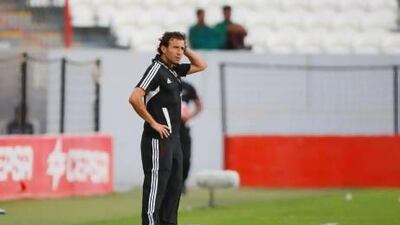If you think Arsene Wenger and Rafa Benitez have problems, spare a thought for Al Jazira's new coach Luis Milla, who has hardly had time to settle in to his office before doubts over his future in Abu Dhabi have started to surfaced.
Tonight, Jazira host Al Shabab of Saudi Arabia in their second Group A game of the 2013 Asian Champions League, and already Milla, in only his fourth game in charge of the Abu Dhabi club, is at a crossroads. Still to win a game since joining, the former Barcelona and Real Madrid midfielder, and Spain Olympic team coach, knows tonight's match is one he dare not lose.
In many ways, the intense scrutiny he finds himself under is not of his own doing.
On February 21, Jazira dismissed his stunned predecessor, Paulo Bonamigo, who had just seen his players extend their league unbeaten run to 12 matches with a 4-1 victory over Al Dhafra. Jazira were second in the table, just six points behind Al Ain.
Milla's first task could not have been more daunting: a trip to Iran, for a Champions League group match, against Tractor Sazi Tabriz. Not surprisingly, inside a packed stadium, and in a hostile atmosphere, Jazira suffered a 3-1 defeat.
A subsequent 1-0 loss to the UAE champions Al Ain and 3-3 draw with second-from-bottom Dibba, have left Jazira trailing the title holders and leaders by 11 points, in fourth place, their hopes of challenging for the championship all but gone.
No manager deserves to be judged over such a short period and, in retrospect, Jazira were always facing long odds, on the road in Iran and Al Ain. Moreover, the team's poor run is further proof of the instability and confusion that constant chopping and changing of managers inevitably brings to a club.
In the past 10 years, only one coach, the Brazilian Abel Braga, between 2008 and 2011, has managed to stay in the Jazira hot seat for more than one season.
Not surprisingly, his reign coincided with the most successful period in the club's history, winning the Pro League title, the President's Cup and the Etisalat Cup. Whether he lasted so long because he was successful, or successful because he lasted so long, is almost immaterial; the correlation between stability and success is undeniable.
Certainly, Jazira are not alone in this aspect; Al Wasl's troubles this season have stemmed from the appointment of four managers since Diego Maradona was shown the door last summer.
And while the departure of Bruno Metsu was due, sadly, to illness, the continued turmoil at the club since then led on Sunday to the resignation of the entire board of directors, with the club struggling in ninth place.
The list of managerial dismissals at Jazira and Wasl are echoed at practically every other club in the league. Astonishingly, since the inception of the UAE Pro League five years ago, only a handful of managers have survived for two years in their roles and only Braga survived for three full seasons.
Clubs may point to the fact that the Emirati league season is, at 26 games per team as of this season, and 22 previously, a relatively short one and losing sequences must be dealt with more urgently.
In other countries, however, there have been numerous examples of coaches achieving success after being given adequate time to shape their team and tactics.
Here, the UAE national team seems to be providing a new and enlightening path towards stability and success.
And the blueprint seems simple enough: devise a long-term plan, give coaches time to implement it and, when the time comes for change, promote from within.
Over the past year in particular, the results have been spectacular.
Having failed to retain a single coach for more than a two-year stretch in the previous two decades, the UAE's decision to hire the Emirati coach Mahdi Ali has already resulted in Gulf Cup success in January.
And the signs are that the team's young nucleus, most of whom for years had worked under the same management team in age-group competitions, is ready to qualify for the 2015 Asian Cup in Australia before the serious challenge of reaching the 2018 World Cup in Russia begins.
Club football is a different beast. Still, it is hoped Emirati clubs someday will appreciate the value of sticking with their man.
For now, it is too early to judge Milla, or indeed Jazira's decision to appoint him, regardless of the result against the Saudi team.
And if snap judgements in the past have only served to put pressure on managers when results do not improve immediately, then surely a few high-profile wins should buy them time as well.
Milla certainly will be hoping that is the case come the 7.30pm kick-off time at Mohammed bin Zayed Stadium tonight.

